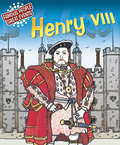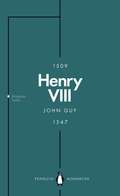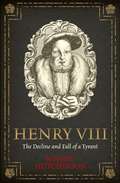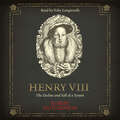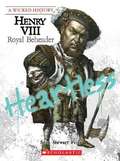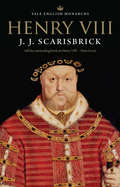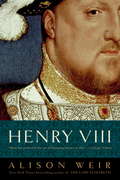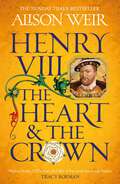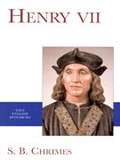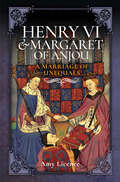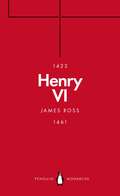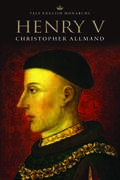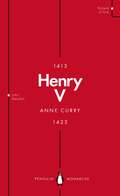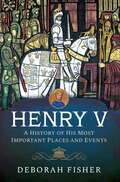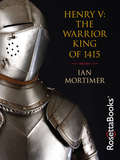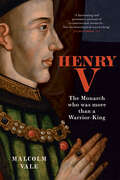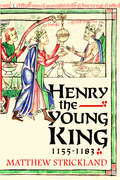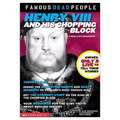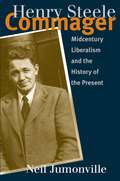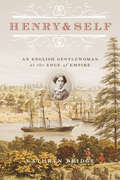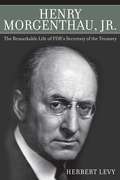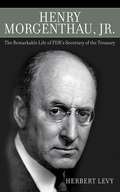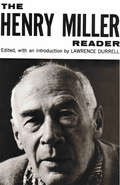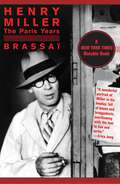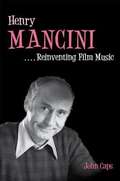- Table View
- List View
Henry VIII (Famous People, Great Events #5)
by Harriet CastorExciting stories about famous people, outlining their lives and the important events which made them memorable. Every page features easy-to-follow text and a black-and-white line drawing to help bring these events to life. Each title gives further facts about the famous person and the times in which he or she lived, plus a comprehensive time line detailing key dates. Henry VIII is an exciting tale of kings and queens, jousting knights and grisly executions. It explains how Henry took power away from the Church in his quest for an heir to inherit his kingdom.
Henry VIII: The Quest for Fame (Penguin Monarchs)
by John GuyCharismatic, insatiable and cruel, Henry VIII was, as John Guy shows, a king who became mesmerized by his own legend - and in the process destroyed and remade England. Said to be a 'pillager of the commonwealth', this most instantly recognizable of kings remains a figure of extreme contradictions: magnificent and vengeful; a devout traditionalist who oversaw a cataclysmic rupture with the church in Rome; a talented, towering figure who nevertheless could not bear to meet people's eyes when he talked to them. In this revealing new account, John Guy looks behind the mask into Henry's mind to explore how he understood the world and his place in it - from his isolated upbringing and the blazing glory of his accession, to his desperate quest for fame and an heir and the terrifying paranoia of his last, agonising, 54-inch-waisted years.
Henry VIII: The Decline and Fall of a Tyrant
by Robert HutchinsonThe Tudors retained only a precarious grip on the crown of England, founded on a title that was both tenuous and legally flimsy. This left them preoccupied by two major obsessions: the necessity for a crop of lusty male heirs to continue the bloodline, and the elimination of threats from dynastic rivals. None was cursed more by this rampant insecurity than Henry VIII, who embodied not only the power and imperial majesty of the monarchy, but also England's military might. His health always had huge political consequences at home and overseas - hence his unbridled hypochondria.Drawing on the latest historical and medical research, Robert Hutchinson reveals the extent to which the king also grappled with accelerating geriatric decay in his last six years, made more acute by medical conditions that were not only painful but transformed the monarch into a 28-stone psychotic monster, suspicious of everyone around him, including those most dear to him.
Henry VIII: The Decline and Fall of a Tyrant
by Robert HutchinsonThe Tudors retained only a precarious grip on the crown of England, founded on a title that was both tenuous and legally flimsy. This left them preoccupied by two major obsessions: the necessity for a crop of lusty male heirs to continue the bloodline, and the elimination of threats from dynastic rivals. None was cursed more by this rampant insecurity than Henry VIII, who embodied not only the power and imperial majesty of the monarchy, but also England's military might. His health always had huge political consequences at home and overseas - hence his unbridled hypochondria.Drawing on the latest historical and medical research, Robert Hutchinson reveals the extent to which the king also grappled with accelerating geriatric decay in his last six years, made more acute by medical conditions that were not only painful but transformed the monarch into a 28-stone psychotic monster, suspicious of everyone around him, including those most dear to him.
Henry VIII: Royal Beheader
by Sean PriceA children's biography of Henry VIII, King of England, who had 6 wives and beheaded 2 of them.
Henry VIII
by J. J. ScarisbrickHenry VIII's forceful personality dominated his age and continues to fascinate our own. In few other reigns have there been developments of such magnitude--in politics, foreign relations, religion, and society--that have so radically affected succeeding generations. Above all the English Reformation and the break with Rome are still felt more than four centuries on.First published in 1968, J. J. Scarisbrick's Henry VIII remains the standard account, a thorough exploration of the documentary sources, stylishly written and highly readable. In an updated foreword, Professor Scarisbrick takes stock of subsequent research and places his classic account within the context of recent publications."It is the magisterial quality of J.J. Scarisbrick's work that has enabled it to hold the field for so long."--Steve Gunn, Times Literary Supplement
Henry VIII: The King and His Court
by Alison WeirHenry VIII, renowned for his command of power, celebrated for his intellect, presided over the most stylish--and dangerous--court in Renaissance Europe. Scheming cardinals vied for power with newly rich landowners and merchants, brilliant painters and architects introduced a new splendor into art and design, and each of Henry's six queens brought her own influence to bear upon the life of the court. In her new book, Alison Weir, author of the finest royal chronicles of our time, brings to vibrant life the turbulent, complex figure of Henry VIII and the glittering court he made his own. In an age when a monarch's domestic and political lives were inextricably intertwined, a king as powerful and brilliant as Henry VIII exercised enormous sway over the laws, the customs, and the culture of his kingdom. Yet as Weir shows in this swift, vivid narrative, Henry's ministers, nobles, and wives were formidable figures in their own right, whose influence both enhanced and undermined the authority of the throne. On a grand stage rich in pageantry, intrigue, passion, and luxury, Weir records the many complex human dramas that swirled around Henry, while deftly weaving in an account of the intimate rituals and desires of England's ruling class--their sexual practices, feasts and sports, tastes in books and music, houses and gardens. Stimulating and tumultuous, the court of Henry VIII attracted the finest minds and greatest beauties in Renaissance England--poets Wyatt and Surrey, the great portraitist Hans Holbein, "feasting ladies" like Elizabeth Blount and Elizabeth FitzWalter, the newly rich Boleyn family and the ancient aristocratic clans like the Howards and the Percies, along with the entourages and connections that came and went with each successive wife. The interactions between these individuals, and the terrible ends that befell so many of them, make Henry VIII: The King and His Court an absolutely spellbinding read. Meticulous in historic detail, narrated with high style and grand drama, Alison Weir brilliantly brings to life the king, the court, and the fascinating men and women who vied for its pleasures and rewards. NOTE: This edition does not contain illustrations.
Henry VIII: 'this novel makes Henry VIII’s story feel like it has never been told before' (Tracy Borman)
by Alison Weir'Gets under the skin of the man who is so often dismissed as a much-married monster and gives us an altogether more nuanced, compelling and human portrayal' TRACY BORMANSix wives. One King. You know their stories. Now it's time to hear his.The magnificent new Tudor novel from the author of the Sunday Times-bestselling Six Tudor Queens series. ---A second son, not born to rule, becomes a man, and a king... In grand royal palaces, Prince Harry grows up dreaming of knights and chivalry - and the golden age of kings that awaits his older brother. But Arthur's untimely death sees Harry crowned King Henry of England.As his power and influence extends, so commences a lifelong battle between head and heart, love and duty. Henry rules by divine right, yet his prayers for a son go unanswered.The great future of the Tudor dynasty depends on an heir. And the crown weighs heavy on a king with all but his one true desire. HENRY VIII. HIS STORY.Alison Weir's most ambitious Tudor novel yet reveals the captivating story of a man who was by turns brilliant, romantic, and ruthless: the king who changed England forever.---PRAISE FOR ALISON WEIR'S TUDOR FICTION'As always, Alison Weir is ahead of the curve - and at the top of her game. Her wide knowledge and unparalleled understanding of the Tudor era fuels a sympathetic, but never sycophantic, portrait of England's most compelling king' Sarah Gristwood'History has the best stories and they should all be told like this' Conn Iggulden'This is royal Tudor life both in broad scope and intimate detail and readers are in for a sumptuous journey' Elizabeth Chadwick'With Elizabeth of York, Alison Weir gives us her most compelling heroine yet... This is where the story of the Tudors begins and is historical fiction at its absolute best' Tracy Borman'This series is a serious achievement' The Times'Weir is excellent on the little details that bring a world to life' Guardian'Profoundly moving... lingers long after the last page' Elizabeth Fremantle'Well researched and engrossing' Good Housekeeping'Vivid characters and a wonderful sense of time and place' Barbara Erskine'Hugely enjoyable . . . Alison Weir knows her subject and has a knack for the telling and textural detail' Daily Mail
Henry VII
by Stanley B. ChrimesFounder of the Tudor dynasty, Henry VII was a crucial figure in English history. In this acclaimed study of the king's life & reign, the distinguished historian S. B. Chrimes explores the circumstances surrounding Henry's acquisition of the throne, examines the personnel & machinery of government, & surveys the king's social, political, & economic policies, law enforcement, & foreign strategy. This edition of the book includes a new critical introduction & bibliographical updating by George Bernard.
Henry VI & Margaret of Anjou: A Marriage of Unequals
by Amy Licence“An illuminating and entertaining read . . . an analytical assessment of the two figures who led the Lancastrian faction during the Wars of the Roses.” —History . . . The Interesting Bits!He became king before his first birthday, inheriting a vast empire from his military hero father; she was the daughter of a king without power, who made an unexpected marriage at the age of fifteen. Almost completely opposite in character, together they formed an unlikely but complimentary partnership.Henry VI and Margaret of Anjou have become famous as the Lancastrian king and queen who were deposed during the Wars of the Roses but there is so much more to their story. The political narrative of their years together is a tale of twists and turns, encompassing incredible highs, when they came close to fulfilling their desires, and terrible, heart-breaking lows. Personally, their story is an intriguing one that raises may questions. Henry was a complex, misunderstood man, enlightened and unsuited to his times and the pressures of kingship. In the end, overcome by fortune and the sheer determination of their enemies, their alliance collapsed. England simply wasn’t ready for a gentle king like Henry, or woman like Margaret who defied contemporary stereotypes of gender and queenship.History has been a harsh judge to this royal couple. In this discerning dual biography, Amy Licence leads the way in a long-overdue re-evaluation of their characters and contributions during a tumultuous and defining period of British history. “A delight to read . . . A fresh new look at this power couple.” —Adventures of a Tudor Nerd
Henry VI (Penguin Monarchs)
by James RossHenry VI, son of the all-conquering Henry V, was one of the least able and least successful of English kings. His long reign, which started when he was only nine months old, ended in catastrophe, with the loss of England's territories in France and a bankrupt England's long decline into civil war: the wars of the Roses. Yet, failure though Henry undoubtedly was, he remains an enigma. Was he always, as he became in the last disastrous years of his rule, a holy fool, simple-minded to the point of insanity and prey to the ambitions of others? Or was he more active and, as some have suggested, actively malign? In this groundbreaking new portrait, James Ross shows a king whose priorities diverged sharply from what England expected of its monarchs, and whose fitful engagement with government was directly, though not solely, responsible for the disasters that engulfed the kingdom during his reign.
Henry V
by Christopher AllmandThanks in part to Shakespeare, Henry V is one of England's best-known monarchs. The image of the king leading his army against the French, and the great victory at Agincourt, are part of English historical tradition. Yet, though indeed a soldier of exceptional skill, Henry V's reputation needs to be seen against a broader background of achievement. This sweepingly majestic book is based on the full range of primary sources and sets the reign in its full European context. Christopher Allmand shows that Henry V not only united the country in war but also provided domestic security, solid government, and a much needed sense of national pride. The book includes an updated foreword which takes stock of more recent publications in the field. "A far more rounded picture of Henry as a ruler than any previous study."--G.L. Harris, The Times
Henry V: From Playboy Prince to Warrior King (Penguin Monarchs)
by Anne CurryForemost medieval historian Anne Curry offers a new reinterpretation of Henry V and the battle that defined his kingship: AgincourtHenry V's invasion of France, in August 1415, represented a huge gamble. As heir to the throne, he had been a failure, cast into the political wilderness amid rumours that he planned to depose his father. Despite a complete change of character as king - founding monasteries, persecuting heretics, and enforcing the law to its extremes - little had gone right since. He was insecure in his kingdom, his reputation low. On the eve of his departure for France, he uncovered a plot by some of his closest associates to remove him from power. Agincourt was a battle that Henry should not have won - but he did, and the rest is history. Within five years, he was heir to the throne of France. In this vivid new interpretation, Anne Curry explores how Henry's hyperactive efforts to expunge his past failures, and his experience of crisis - which threatened to ruin everything he had struggled to achieve - defined his kingship, and how his astonishing success at Agincourt transformed his standing in the eyes of his contemporaries, and of all generations to come.
Henry V: A History of His Most Important Places and Events
by Deborah FisherThere are many books about King Henry V, several of which concentrate entirely on his victory at the Battle of Agincourt in 1415. This one looks at his life from a different point of view, concentrating on places that were important in his life and can still be visited by those interested in getting a better feel for the man and understanding how his character was shaped by his environment. Henry spent much of his youth on military campaigns in Ireland, Wales and the Marches. As Prince of Wales, he became battle-hardened as a teenager when he received a near-fatal wound at Shrewsbury. Despite a fraught relationship with his father, he quickly reinvented himself as a model king, and set his eyes firmly on the crown of France. Thereafter, much of his nine-year reign was spent on military campaigns beyond the British Isles. The book takes its reader on a journey from the rural areas around Monmouth, where he was born, to Harlech Castle, where he put an end to Owain Glyndwr's rebellion, and from his coronation at Westminster Abbey to his private retreat at Kenilworth. We see him seize Harfleur and take the long road to Calais, culminating in the Battle of Agincourt, one of the most spectacular victories ever won by an English army. We follow his continued campaigns in France, through his marriage to Catherine of Valois at Troyes, to his eventual, tragically premature, death at Vincennes.
Henry V: The Warrior King of 1415
by Ian MortimerFrom an award-winning historian: &“A new and convincing likeness of medieval England&’s most iconic king&” (The Sunday Times). This biography by the bestselling author of The Time Traveler&’s Guide to Medieval England takes an insightful look at the life of Henry V, casting new light on a period in history often held up as legend. A great English hero, Henry V was lionized by Shakespeare and revered by his countrymen for his religious commitment, his sense of justice, and his military victories. Here, noted historian and biographer Ian Mortimer takes a look at the man behind the legend and offers a clear, historically accurate, and realistic representation of a ruler who was all too human—and digs up fascinating details about Henry V&’s reign that have been lost to history, including the brutal strategies he adopted at the Battle of Agincourt. &“The most illuminating exploration of the reality of 15th-century life that I have ever read.&” —The Independent &“Compelling, exuberant . . . vivid.&” —Simon Sebag Montefiore, New York Times–bestselling author of The Romanovs: 1613–1918
Henry V: The Conscience of a King
by Mr Malcolm ValeFor curious readers young and old, a rich and colorful history of religion from humanity's earliest days to our own contentious times In an era of hardening religious attitudes and explosive religious violence, this book offers a welcome antidote. Richard Holloway retells the entire history of religion--from the dawn of religious belief to the twenty-first century--with deepest respect and a keen commitment to accuracy. Writing for those with faith and those without, and especially for young readers, he encourages curiosity and tolerance, accentuates nuance and mystery, and calmly restores a sense of the value of faith. Ranging far beyond the major world religions of Judaism, Islam, Christianity, Buddhism, and Hinduism, Holloway also examines where religious belief comes from, the search for meaning throughout history, today's fascinations with Scientology and creationism, religiously motivated violence, hostilities between religious people and secularists, and more. Holloway proves an empathic yet discerning guide to the enduring significance of faith and its power from ancient times to our own.
Henry the Young King, 1155-1183
by Matthew StricklandThis first modern study of Henry the Young King, eldest son of Henry II but the least known Plantagenet monarch, explores the brief but eventful life of the only English ruler after the Norman Conquest to be created co-ruler in his father's lifetime. Crowned at fifteen to secure an undisputed succession, Henry played a central role in the politics of Henry II's great empire and was hailed as the embodiment of chivalry. Yet, consistently denied direct rule, the Young King was provoked first into heading a major rebellion against his father, then to waging a bitter war against his brother Richard for control of Aquitaine, dying before reaching the age of thirty having never assumed actual power. In this remarkable history, Matthew Strickland provides a richly colored portrait of an all-but-forgotten royal figure tutored by Thomas Becket, trained in arms by the great knight William Marshal, and incited to rebellion by his mother Eleanor of Aquitaine, while using his career to explore the nature of kingship, succession, dynastic politics, and rebellion in twelfth-century England and France.
Henry the VIII and His Chopping Block
by Alan MacdonaldThis biography series is filled with humorous and gory details that children are not likely to learn in any history class. In this biography, readers learn all about the most famous of England's many kings, from the food that Henry VIII ate to his six wives.
Henry Steele Commager
by Neil JumonvilleHistorian Henry Steele Commager (1902-1998) was one of the leading American intellectuals of the mid-twentieth century. Author or editor of more than forty books, he taught for decades at New York University, Columbia University, and Amherst College and was a pioneer in the field of American studies. But Commager's work was by no means confined to the halls of the university: a popular essayist, lecturer, and political commentator, he earned a reputation as an activist for liberal causes and waged public campaigns against McCarthyism in the 1950s and the Vietnam War in the 1960s. As few have been able to do in the past half-century, Commager united the two worlds of scholarship and public intellectual activity. Through Commager's life and legacy, Neil Jumonville explores a number of questions central to the intellectual history of postwar America. After considering whether Commager and his associates were really the conservative and conformist group that critics have assumed them to be, Jumonville offers a reevaluation of the liberalism of the period. Finally, he uses Commager's example to ask whether intellectual life is truly compatible with scholarly life.
Henry & Self: An English Gentlewoman at the Edge of Empire
by Kathryn BridgeAn intimate portrait of privilege and struggle, scandal and accolade, from the Old World to the new colonies of Vancouver's Island and British Columbia.At the age of 33, Sarah Crease left her home in England to travel with her young family to a farflung outpost of the British Empire on the Pacific coast of North America. The detailed journals, letters and artwork she created over the next half century as she and her husband, Henry, established themselves in the New World offer a rich window into the private life and views of an English colonist in British Columbia.This is a woman's story in her own words. It is also a story of the times she lived in, and of how her class, social standing and role as a settler shaped her relationships with the world around her. Henry & Self is the personal account of a remarkable woman who lived through nearly a century of colonial history, but it is also a unique perspective on the beliefs and motivations that shaped that century.
Henry Morgenthau Jr.: The Remarkable Life of FDR's Secretary of the Treasury
by Herbert LevyA fascinating exploration of early to mid-twentieth-century politics as seen through the eyes of a Roosevelt technocrat. History seems to repeat itself. With ongoing wars abroad and the collapse of financial institutions at home, Americans rely on President Barack Obama and Secretary of the Treasury Jacob Lew to bring about positive change. When the US stock market collapsed in 1928 and World War II broke out, the nation turned to Franklin D. Roosevelt and his Secretary of the Treasury, Henry Morgenthau, Jr. , for leadership. Henry Morgenthau, Jr. explores the life of this native New Yorker. Born into a prominent Jewish family, Henry Morgenthau, Jr. , became a controversial figure in politics. Yet, his contributions were integral to social, political, and economic milestones in American history, all while he grappled with his identity as an American Jew during the atrocities of WWII in Europe. This new biography offers a glimpse of yesterday and lessons for today. Author Herbert Levy offers an extensively researched life of this important American leader. From thorough research in the archives of Hyde Park to careful study of Morgenthau’s letters, Levy delivers an in-depth account of the fascinating life of this remarkable man. This book explores the complex and oftentimes frustrating world in which Morgenthau was forced to live and illuminates his odyssey as a Roosevelt technocrat.
Henry Morgenthau, Jr.
by Herbert LevyHenry Morgenthau, Jr. was a young man living in an interesting political and social atmosphere. Surrounded by people who viewed the world through a Social Darwinist lens, and grappling with his identity as an American Jew during the atrocities of WWII in Europe, Henry Morgenthau, Jr. played an integral role as Roosevelt's secretary of the treasury during a tough economic and political time. Henry Morgenthau, Jr. explores the life of this native New Yorker, growing up in a business-minded family, spending most of his teenage years at boarding school, and feeling isolated from his peers. Morgenthau found true passion in farming, and it served him well during the years that FDR was governor of New York and again after Morgenthau's retirement from political life. Morgenthau established not only a working relationship with FDR during his presidency, but also a personal relationship, one that allowed him some freedom of expression in what he viewed as a sometimes intolerant era. Herbert Levy has done extensive research at the archives in Hyde Park to include many of Morgenthau's personal letters in this in-depth account of the man who crafted a controversial plan for the reconstitution of Germany. This book explores the complex and oftentimes frustrating world in which Morgenthau was forced to live and illuminates his odyssey as a Roosevelt technocrat.
The Henry Miller Reader (Essay Index Reprint Ser.)
by Henry Miller Lawrence DurrellA collection of works spanning the entire career of great 20th-century American writer Henry Miller, edited and introduced by Lawrence Durrell. In 1958, when Henry Miller was elected to membership in the American Institute of Arts and Letters, the citation described him as: "The veteran author of many books whose originality and richness of technique are matched by the variety and daring of his subject matter. His boldness of approach and intense curiosity concerning man and nature are unequalled in the prose literature of our times." It is most fitting that this anthology of "the best" of Henry Miller should have been assembled by one of the first among Miller’s contemporaries to recognize his genius, the eminent British writer Lawrence Durrell. Drawing material from a dozen different books Durrell has traced the main line and principal themes of the "single, endless autobiography" which is Henry Miller’s life work. "I suspect," writes Durrell in his Introduction, "that Miller’s final place will be among those towering anomalies of authorship like Whitman or Blake who have left us, not simply works of art, but a corpus of ideas which motivate and influence a whole cultural pattern." Earlier, H. L. Mencken had said, "his is one of the most beautiful prose styles today," and the late Sir Herbert Read had written that "what makes Miller distinctive among modern writers is his ability to combine, without confusion, the aesthetic and prophetic functions." Included are stories, "portraits" of persons and places, philosophical essays, and aphorisms. For each selection Miller himself prepared a brief commentary which fits the piece into its place in his life story. This framework is supplemented by a chronology from Miller’s birth in 1891 up to the spring of 1959, a bibliography, and, as an appendix, an open letter to the Supreme Court of Norway written in protest of the ban on Sexus, a part of which appears in this volume.
Henry Miller: The Paris Years
by Brassaï&“A wonderful portrait of Miller in his heyday: full of beans and braggadocio, overflowing with the lust to live and write.&”—Erica Jong His years in Paris were the making of Henry Miller. He arrived with no money, no fixed address, and no prospects. He left as the renowned if not notorious author of Tropic of Cancer and Tropic of Capricorn. Miller didn&’t just live in Paris—he devoured it. It was a world he shared with Brassaï, whose work, first collected in Paris by Night, established him as one of the greatest photographers of the twentieth century and the most exquisite and perceptive chronicler of Parisian vice. In Miller, Brassaï found his most compelling subject. Henry Miller: The Paris Years is an intimate account of a writer&’s self-discovery, seen through the unblinking eye of a master photographer. Brassaï delves into Miller&’s relationships with Anaïs Nin and Lawrence Durrell, as well as his hopelessly tangled though wildly inspiring marriage to June. He uncovers a side of the man scarcely known to the public, and through this careful portrait recreates a bright and swift-moving era. Most of all, Brassaï evokes their shared passion for the street life of the City of Light, captured in a dazzling moment of illumination.
Henry Mancini: Reinventing Film Music (Music in American Life)
by John CapsHenry Mancini, the first publicly successful and personally recognizable film composer in history, has practically become a Hollywood brand name. In his lifetime, he sold thirty million albums and won four Oscars and twenty Grammy awards. Through Mancini, mere background music in movies became part of pop culture--an expression of sophistication and wit with a modern sense of cool and a lasting lyricism that has not dated. The first comprehensive study of Mancini's music, Henry Mancini: Reinventing Film Music describes how the composer served as a bridge between the Big Band period of World War II and the impatient eclecticism of the Baby Boomer generation, between the grand formal orchestral film scores of the past and a modern American minimalist approach. Mancini's sound seemed to capture the bright, confident, welcoming voice of the middle class's new efficient life: interested in pop songs and jazz, in movies and television, in outreach politics but also conventional stay-at-home comforts. As John Caps shows, Mancini easily combined it all in his music. Mancini wrote his first dramatic music for a radio series in 1950. By the mid-1960s, he wielded influence in Hollywood and around the world with his iconic scores: dynamic jazz for the noirish detective TV show Peter Gunn, the sly theme from The Pink Panther, and his wistful folk song "Moon River" from Breakfast at Tiffany's. Following the evolution of Mancini's style, Caps traces the history of movie scoring in general: from the jazz-pop of the 1960s to the edgier, electro-funk harmonies of the Watergate 1970s, from the revisionist 1980s marked by New Age trends and new jazz chords to the frustrating New Hollywood of the 1990s when films were made by committees of lawyers rather than by artisans. Through insightful close readings of key films, Caps traces Mancini's collaborations with important directors and shows how he homed in on specific dramatic or comic aspects of each film to create musical effects through clever instrumentation, eloquent melodies, and the strong narrative qualities of his scores. Accessible and engaging, this fresh view of Mancini's oeuvre and influence will delight and inform fans of film and popular music.
